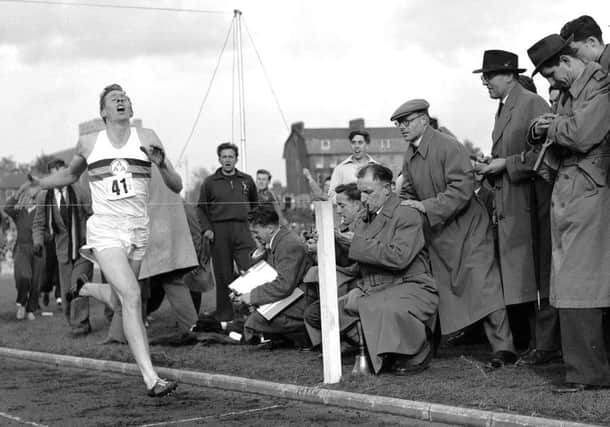David Behrens: Lamenting lost Corinthian values from a glorious bygone age as Sir Roger Bannister celebrated


The death of another sporting knight, Roger Bannister, took us back to an earlier era of athletic endeavour, one in which Britain was an empire of glorious amateurs who could take on the world and still turn up for a proper job next morning.
In a country with not enough food to go around, Bannister’s four-minute mile in 1954, just a year after a British expedition had conquered Everest, struck a note of hopefulness and positivism that is entirely alien in the cynical country we have become.
Advertisement
Hide AdAdvertisement
Hide AdThe black-and-white footage of him collapsing into the arms of officials at the end of his historic run at Iffley Park in Oxfordshire has been on TV in an almost-endless loop since his passing last weekend. But my eye was drawn to the officials themselves: they defined the Britain of the time as much as he did.
The timekeepers at the trackside wore ties, brogues and identical gabardine macs, buttoned to the neck and belted at the waist. The head timekeeper was puffing on his pipe as Bannister romped past.
He was running for his life but not for his living. Neither were his pacemen, Christopher Chataway and Chris Brasher. Bannister was more intent on becoming a neurologist, which he did. Chataway became ITN’s first newsreader and then a politician. Brasher founded a sports goods company.
They weren’t our only part-time celebrities. Broadcasters, too, juggled their radio appearances with more respectable occupations. The ventriloquist Peter Brough ran a textile factory; Kenneth Horne worked for Triplex Glass.
Advertisement
Hide AdAdvertisement
Hide AdBannister was the first to admit that good timing and good luck helped secure his place in sporting history, He had worked hard but only in short bursts. “Why train for hours for a race that’s over in four minutes?” he reasoned. Given different weather, his legacy could have belonged to the Australian John Landy, who beat Bannister’s time less than seven weeks later. He was also an amateur; he went on to become Governor of Victoria.
It could also have gone to a Yorkshireman called Derek Ibbotson, who beat both Bannister and Landy’s records three years later. Sadly, history is recorded by those who get there first, and when Ibbotson died last year, the headlines were in smaller type.
“Ibbo” was a big name in his day, his gentle West Riding voice familiar to a generation of Sportsreel listeners. The son of a coachbuilder on the corporation buses, he worked for Plessey and trained himself at the Leeds Road playing fields in Huddersfield.
Dye from the ICI factory blew over him as he ran past.
Other than the ones his father worked on, there were no coaches up north, he recalled. Neither were there sponsors nor oceans of logos.
Advertisement
Hide AdAdvertisement
Hide AdHis five-week-old daughter was at the side of the cinder track at White City when he ran his mile in 3m 57.2s. It was the last time a world mile record was set in Britain, and Ibbo retired from competition and went into a career in marketing.
The achievements of self-made giants like Bannister and Ibbotson make the events that have engulfed Bradley Wiggins all the more lamentable. The story is this: a Parliamentary report accused him and his backers, Team Sky, of “crossing an ethical line” by taking a banned steroid to treat his asthma and pollen allergies. As a result, he is having to face down calls to be stripped of his 2012 Tour de France title. An enormous amount of corporate money hangs on the outcome.
I’m not qualified to judge the merits of this, but I can’t be the only person to wonder whether sport is really the better for the commercial pressures and social expectations it has had to serve since Bannister and Ibbotson’s day.
Wiggins was knighted the year after his victory in France, and we expected nothing less: an investiture at the Palace has become almost an extension of the ceremony on the podium.
Bannister, on the other hand, had to wait 21 years to become Sir Roger. But he was a class act with whom the Palace, let alone the rest of us, could never keep up.